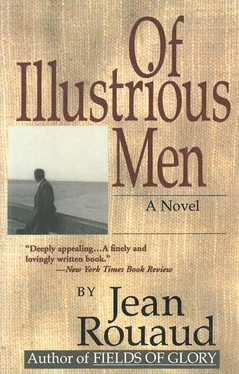Jean Rouaud - Of Illustrious Men
Здесь есть возможность читать онлайн «Jean Rouaud - Of Illustrious Men» весь текст электронной книги совершенно бесплатно (целиком полную версию без сокращений). В некоторых случаях можно слушать аудио, скачать через торрент в формате fb2 и присутствует краткое содержание. Год выпуска: 2011, Издательство: Arcade Publishing, Жанр: Современная проза, на английском языке. Описание произведения, (предисловие) а так же отзывы посетителей доступны на портале библиотеки ЛибКат.
- Название:Of Illustrious Men
- Автор:
- Издательство:Arcade Publishing
- Жанр:
- Год:2011
- ISBN:нет данных
- Рейтинг книги:4 / 5. Голосов: 1
-
Избранное:Добавить в избранное
- Отзывы:
-
Ваша оценка:
- 80
- 1
- 2
- 3
- 4
- 5
Of Illustrious Men: краткое содержание, описание и аннотация
Предлагаем к чтению аннотацию, описание, краткое содержание или предисловие (зависит от того, что написал сам автор книги «Of Illustrious Men»). Если вы не нашли необходимую информацию о книге — напишите в комментариях, мы постараемся отыскать её.
Of Illustrious Men — читать онлайн бесплатно полную книгу (весь текст) целиком
Ниже представлен текст книги, разбитый по страницам. Система сохранения места последней прочитанной страницы, позволяет с удобством читать онлайн бесплатно книгу «Of Illustrious Men», без необходимости каждый раз заново искать на чём Вы остановились. Поставьте закладку, и сможете в любой момент перейти на страницу, на которой закончили чтение.
Интервал:
Закладка:
Previously unknown in Random, Emilienne was known from then on as “Pilate’s wife,” a pseudonym that stuck. This training in perfidy as the consort of the most famous of all lily-livered hygienists, reinforced a few months later by her character of Milady, would, it seemed, decide her fate. Jesus reincarnated as d’Artagnan (in both cases, the young farm worker had owed his role less to his acting talents than to his mop of wavy hair), had also been touched by grace. Speaking from the horse trough into which the gentleman had knocked him, he addressed the gentleman in scathing tones: “Monsieur, you are as cowardly as Madame is beautiful.” Then, when he turned to the winsome lady, words failed him. “And vice versa,” our aunt prompted him, which was supposed to mean “Madame, you are as beautiful as Monsieur is cowardly.” But the flustered gallant could no longer marshal his thoughts. And, as the beauty was growing impatient, he addressed her in a mumble: “And vice versa,” and then, blushing, pretended to faint.
Our little aunt probably raised her eyes to heaven, which, for her, came to the same thing as calling on God to witness her earthly woes, and then turned them anxiously toward the wings, from which Planchet was supposed to make his entrance. She had entrusted him with the job of changing two of the signboards: MEUNG-SUR-LOIRE to PARIS, and HÔTEL DU FRANC MEUNIER to POMME DE PIN. Even though his role had been thoroughly slimmed down, the gardener had given her plenty of headaches during the final rehearsals. The most difficult thing had been to stop him from punctuating his grunts with long brown jets of spittle. Not that he was suffering from a blockage of the bronchial tubes, but he chewed tobacco and spat out his used quid into his beret, which never failed to intrigue the uninitiated. Maryvonne, the wardrobe mistress and makeup artist (she who never wore anything but overalls, and who contented herself with a little pink face powder on Sundays), had suggested that he might expectorate into a handkerchief, which she would embroider with his stage name. Such a tactful thought: he promised to try.
While the others, on the days before the performance, were conscientiously rehearsing their lines, the gardener would be practicing targeting his spittle into a crumpled square of cloth held in the hollow of his hand. The latest news was that his aim was accurate, but our little aunt, with her nose at stage level, was always afraid of being hit by the spray. Her anxiety grew even greater when she discovered that Planchet, who had just entered, had in the meantime grown a whole head taller. He was wearing a tow wig, his outrageously rouged cheekbones made him look like a clown, but that great height, that way of imitating the humble valet, gauche and servile, ever ready to bow down to the ground … “Joseph, is that you?” she said. And the docile Planchet repeated, “Joseph, is that you?” The darkened murmurs coming from the other side of the footlights suddenly gave way to silence. Judging by the voice, there was no longer any doubt. “Joseph, you’re mad.” He repeated, “Joseph, you’re mad.” A stupefied “Oh!” rippled through every row. “Joseph, be careful, there are Germans here.” And he, addressing the audience, “The Cardinal’s spies — here?” All heads anxiously turned toward the German soldiers. However, not understanding the language, they obviously didn’t realize what was going on, and the audience began to chuckle. The murmurs grew louder, laughs rang out, and a wave of applause greeted the intrepid revenant. A few scenes later, the theater was in an uproar. Just as d’Artagnan was setting sail for England to recover the queen’s diamond studs, Planchet came rushing in brandishing two fishing rods. “I’m taking deux gaules” he announced. The house went wild, and as the two companions-in-arms, perched on a little cardboard boat, were crossing the stage against the background of a raging sea, Planchet, as a figurehead, hoisted his two fishing rods as high as his arms could reach, where, against the blue of the backcloth sky, they formed an enormous V.
It was a triumph. But when the actors came on to take their bows, the hero of the evening had once again disappeared. The moment the curtain fell, our little aunt rushed backstage. “Where is he?” she asked Maryvonne. “Gone,” replied the grocery lady, pointing to the stage door. Hadn’t he left a message? Yes, this letter for Emilienne. But for his aunt, who was all the family he had, who was running his business, who had staged his play, and who worried herself sick about her nephew, nothing?
The young men were herded together on the station platform, surrounded by soldiers, waiting for the train that was to transport them to Germany. In spite of the mildness of this steely blue March morning, tempered by a chilly little wind enfilading the tracks, they were warmly equipped in preparation for the harsh climate they had been told to expect. Each man was dressed according to his condition in life, his overcoat more or less well fitting, more or less threadbare; the more humble of them had piled on as many clothes as possible under a tight little jacket whose buttons were feeling the strain. At their feet was a suitcase containing everything they had been ordered to bring with them: a change of clothes, of shoes, either “heavy duty” or “best” (depending on which pair they had put on that morning), and enough provisions to last over a long two-day journey. Some of them had added a knapsack that revealed the neck of a bottle of wine with its cork sticking out — a miraculous commodity in these difficult times. When they extracted their bottle and took a swig, the most swashbuckling among them would first belch, and then boast, “That’s another one the Germans won’t get,” or “Like in 1914, it’s wine that’ll win the war,” which in the circumstances raised no more than a halfhearted smile. Most of them remained silent, like on your first day in a new class at school when you don’t yet know each other, when you’re sizing each other up, hoping to see some signs of fellow feeling. When a distant hissing sound announced the arrival of a train, they turned their resigned faces toward the wide curve in the track around which the expected locomotive would suddenly appear in a cloud of steam.
The most ardent desire of the man who was a head taller than all the rest was to escape attention. This was the moment of truth. When the letter arrived he had known at once that this was not going to be the way he would discover Germany. And as he had had his call-up papers duly stamped, and therefore felt he no longer needed to worry about his aunt, what he had to do now was find some way of giving his companions the slip. Would he wait until he was on board and then jump from the moving train? Or could he manage to escape by unobtrusively sliding under the cars? He was bending over to glance under the train standing at the other platform when a suspicious soldier came up and pushed him back into the ranks with the barrel of his submachine gun. “Cigarette,” he said, pointing to a butt opportunely thrown on the ballast, and he jumped down on the track, retrieved it, and immediately started smoking it with relish to prove his good faith. At least he had seen what he wanted to see. It was possible to creep under a car with his suitcase, and later emerge on the opposite platform — hoping to avoid any unpleasant surprises on that side. All he had to do now was wait for an auspicious moment, stepping back a few paces to try to merge into the crowd of his companions in adversity, coming to terms with his mounting fear, and answering one of the men who suggested making a dash for it by raising his eyebrows questioningly.
When, in a cacophony of connecting rods, pistons, brake shoes, and bursts of steam, the train slowly drew up at the platform, there was a mad rush for the doors in search of seats, since the young men leaning against the windows, having got in at Saint-Nazaire, had announced that there wouldn’t be enough for everyone. While the sentries were fully occupied in restoring discipline by giving gruff orders, he slid down with his suitcase between two cars, worked his way beneath the couplings, and crept under the other train. Lying flat on his stomach across the railroad ties, his heart beating frantically, for an eternity of seconds he awaited the shouts and hysterical activity that would certainly ensue if his escape had been noticed. Every time a whistle blew to signal the departure of a train, he tightened his grip on his suitcase, ready to spring, reproaching himself for having loaded it down with so many books, although not for a single moment did it occur to him to abandon it. As the minutes passed and the normal frenzy of the occupants sounded no more alarming than usual, he began to crawl forward a few yards, all the time keeping a watch on the feet clomping along the platform above him. Even more than a pair of boots, what he dreaded to see were the four paws of a German shepherd, whose nose would certainly have condemned him, whose fangs would have torn him to pieces. But neither boots nor dog appeared. All that was to be seen through the narrow gap between the bottom of the carriage and the edge of the platform was the heartrending procession of miserable substitutes for shoes. Old, worn-out, patched-up shoes, complete with wooden or cork soles, or even with a bit of carpet. He himself, in preparation for his getaway, had made a deal with the postman, who got preferential treatment, and had acquired a pair of sturdy leather shoes. He had remembered a remark made by a prisoner who had escaped from a stalag: “The secret of an escape is shoes.”
Читать дальшеИнтервал:
Закладка:
Похожие книги на «Of Illustrious Men»
Представляем Вашему вниманию похожие книги на «Of Illustrious Men» списком для выбора. Мы отобрали схожую по названию и смыслу литературу в надежде предоставить читателям больше вариантов отыскать новые, интересные, ещё непрочитанные произведения.
Обсуждение, отзывы о книге «Of Illustrious Men» и просто собственные мнения читателей. Оставьте ваши комментарии, напишите, что Вы думаете о произведении, его смысле или главных героях. Укажите что конкретно понравилось, а что нет, и почему Вы так считаете.












